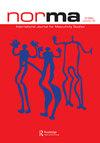Imagining the Welsh nation in a post-patriarchal, post-national world: Y Gwyll/Hinterland and the re-construction of trans/national masculinity
IF 1.5
Q2 SOCIOLOGY
引用次数: 0
Abstract
ABSTRACT Television drama has been a key site to investigate masculinities. This article examines Hinterland/Y Gwyll (S4C, BBC, 2013–2016) in order to understand the interrelationship between critiques of masculinities and the construction of post-national imaginations of the nation. It draws largely on Saskia Sassen’s work [1996, Losing control? Sovereignty in an age of globalization. The 1995 Columbia University Leonard Hastings Schoff memorial lectures. New York: Columbia University Press; 1999, Globalization and its discontents: Essays on the new mobility of people and money. New York: New Press; 2003, Globalization or denationalization? Review of International Political Economy, 10(1), 1–22] on the post-national, developments of R.W. Connell’s [1987, Gender and power. Sydney: Allen and Unwin] theorisation of hegemonic masculinity and Raymond Williams’s [1977, Marxism and literature. Oxford: Oxford University Press] conceptualisation of ‘dominant’, ‘residual’ and ‘emerging’ forms of culture in order to understand how the programme imagines the emergence of a new, post-patriarchal Wales.想象后父权、后民族世界中的威尔士民族:格威尔/辛特兰与跨民族男子气概的重建
摘要电视剧一直是研究男性气质的重要场所。本文考察了Hinterland/Y Gwyll(S4C,英国广播公司,2013-2016),以了解对男性气质的批评与国家后国家想象构建之间的相互关系。它主要借鉴了萨斯基娅·萨森的作品[1996,失去控制?全球化时代的主权。1995年哥伦比亚大学伦纳德·黑斯廷斯·肖夫纪念讲座。纽约:哥伦比亚大学出版社;1999,全球化及其不满:关于新的人员和金钱流动的论文。纽约:新出版社;2003,全球化还是非国有化?国际政治经济学评论,10(1),1-22]后国家,R.W.Connell[1987,性别与权力。Sydney:Allen and Unwin]霸权男子气概理论和Raymond Williams[1977,马克思主义与文学。牛津:牛津大学出版社]对“主导”、“残余”和“新兴”文化形式的概念化,以了解该节目如何想象一种新的、,后父权制的威尔士。
本文章由计算机程序翻译,如有差异,请以英文原文为准。
求助全文
约1分钟内获得全文
求助全文
来源期刊

NORMA
Social Sciences-Gender Studies
CiteScore
3.00
自引率
14.30%
发文量
23
期刊介绍:
NORMA is an international journal for high quality research concerning masculinity in its many forms. This is an interdisciplinary journal concerning questions about the body, about social and textual practices, and about men and masculinities in social structures. We aim to advance theory and methods in this field. We hope to present new themes for critical studies of men and masculinities, and develop new approaches to ''intersections'' with race, sexuality, class and coloniality. We are eager to have conversations about the role of men and boys, and the place of masculinities, in achieving gender equality and social equality. The journal was begun in the Nordic region; we now strongly invite scholarly work from all parts of the world, as well as research about transnational relations and spaces. All submitted manuscripts are subject to initial appraisal by the Editors, and, if found suitable for further consideration, to peer review by independent, anonymous expert referees. All peer review is double blind and submission is online via Editorial Manager.
 求助内容:
求助内容: 应助结果提醒方式:
应助结果提醒方式:


